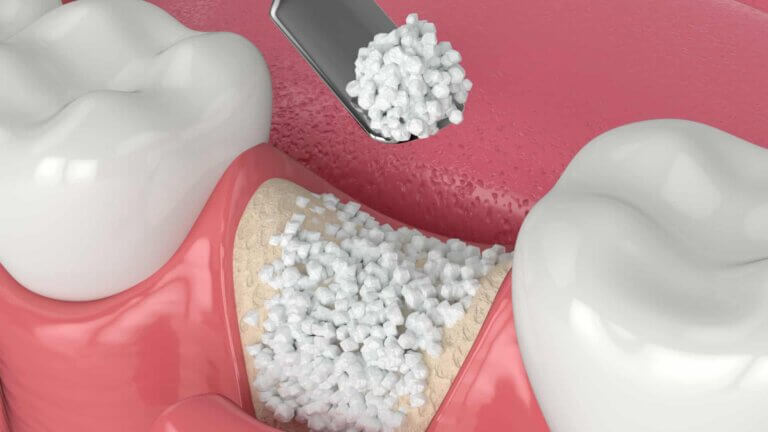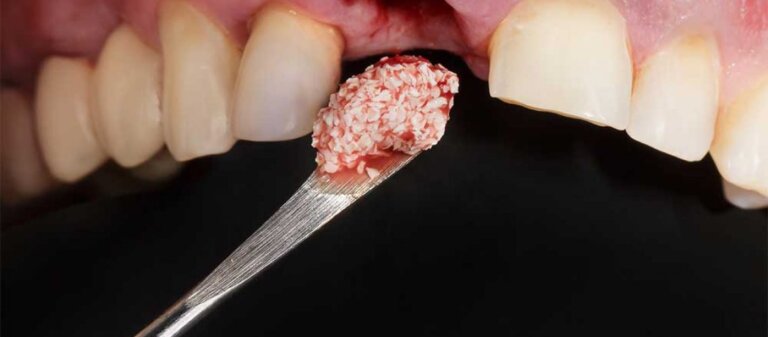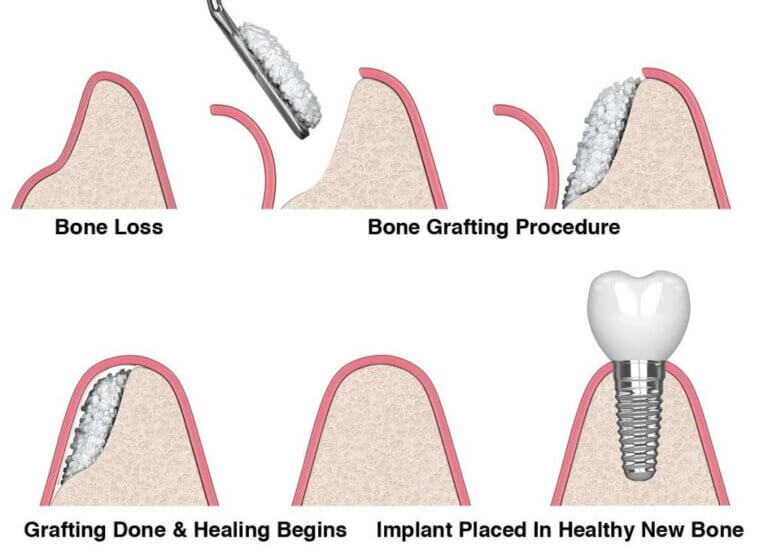Dental Bone Graft

What Is Dental Bone Graft?
Dental bone grafting is a cutting-edge procedure aimed at restoring and strengthening the jawbone, creating a solid foundation for dental implants. Jawbone deterioration, often caused by tooth loss, gum disease, or facial trauma, can make it difficult to support these treatments. Fortunately, modern dental techniques have made it possible to rebuild and fortify the jawbone through bone grafting.
If you’re considering a dental bone graft, it’s essential to understand the process, benefits, and alternatives. Here’s everything you need to know:
- Who Needs A Dental Bone Graft?
- Types Of Dental Bone Graft
- Benefits of a Dental Bone Graft
- How Much Does Dental Bone Graft Cost?
- Steps In The Dental Bone Graft Procedure
- Alternative Treatments To Dental Bone Graft
- Frequently Asked Questions About Dental Bone Graft
If you have any further questions about Dental Bone Graft or other dental services offered at Atlas Dental, please contact us.

Free phone consultation
Have questions about Dental Bone Grafts? Schedule a free phone consultation with our Toronto dentist.

5 star google reviews
Our patients love us! See for yourself why more and more people are choosing Atlas Dental for their dental bone grafts.

Book In Person Consult Online
Book an in-person consult to discuss your bone grafting case.
Who Needs A Dental Bone Graft?
Several factors might make you a candidate for a dental bone graft:
- Tooth Loss and Implants: If you’ve lost teeth due to decay or injury, a bone graft can provide the support needed for dental implants.
- Gum Disease: Advanced periodontitis can erode the jawbone, leading to tooth loss. A bone graft can restore this lost bone and stabilize the teeth.
- Facial Trauma: Injuries to the jaw may require bone grafting to repair fractures and facilitate proper healing.
- Tooth Extractions: Bone grafts can preserve the integrity of the jaw after tooth removal.
- Bone Resorption: Bone loss from missing teeth can reduce oral functionality. Bone grafts reverse this process, improving dental health.
- Denture Wearers: Bone grafting can provide better denture fit by preserving bone structure.
It’s essential to consult with a qualified dentist or oral surgeon to determine whether dental bone grafting is the right solution for your specific needs. If you have further questions about Dental Bone Graft, please contact us.

Types Of Dental Bone Graft
The type of graft used depends on the extent of bone loss and your unique dental needs:
- Autografts: Bone harvested from your own body, typically from the jaw or hip. This is the most effective option for promoting natural bone growth.
- Allografts: Bone from a human donor, processed and sterilized for safe use. Allografts eliminate the need for additional surgery.
- Xenografts: Bone sourced from animals, such as cows or pigs, processed to remove any organic material, offering a safe scaffold for new bone growth.
- Alloplastic Materials: Synthetic grafts made from materials like calcium phosphate, which promote bone regeneration.
Each type of dental bone graft has its advantages and may be more suitable for specific situations. The dentist or oral surgeon will carefully evaluate your condition and recommend the most appropriate grafting material and technique to achieve the best possible outcome for your dental health. If you have further questions about Dental Bone Graft, please contact us.
Benefits of a Dental Bone Graft
Dental bone grafting offers a multitude of advantages that can significantly improve both oral health and overall well-being:
- Restores Bone Volume: Rebuilds lost or weakened bone, providing a stable base for implants or other restorations.
- Supports Dental Implants: Strengthens the jaw for secure implant placement.
- Prevents Further Bone Loss: Stabilizes existing teeth by preventing further bone deterioration.
- Improves Facial Aesthetics: Restores lost bone volume, rejuvenating facial contours for a youthful appearance.
- Long-Term Solution: Once integrated, the graft becomes a permanent part of your jaw, offering long-term support.
Dental bone grafting has revolutionized the field of dentistry, allowing patients to overcome challenging dental situations and achieve improved oral health and aesthetics. If you have further questions about Dental Bone Graft, please contact us.
Cost of Dental Bone Graft
The cost of Dental Bone Graft is approximately $2165. In addition, you should also consider additional costs related to any future dental implants. The codes relevant to Dental bone graft in the Ontario Dental Association’s Suggested Fee Guide appear as follows:
Grafts, Osseous, Allograft (including flap entry and closure)
- 42621 – Per Site: $1665 + Dental Materials Expense (approximately $500)
Dental Bone Graft is usually considered a supplementary service by dental insurance plans and may or may not be covered by your dental insurance. Be sure to find out from your dental insurance plan provider how much you are eligible for before going ahead with dental treatment. Your dentist can help you submit a predetermination to your dental insurance.
For patients without dental insurance, Atlas Dental is pleased to offer dental financing through iFinance Dentalcard. Affordable payment plans start at 7.95% for terms of 6 months to 6 years. To learn more about Dentalcard dental treatment financing, follow this link.
Steps In The Dental Bone Graft Procedure
While specific details may vary depending on the type of bone graft used and the patient’s unique needs, the following are the typical steps involved in a dental bone graft procedure:
- Consultation: Your dentist will assess your jawbone using digital dental x-rays or 3D CBCT scans to determine if a bone graft is right for you.
- Preparation: On the day of surgery, you’ll receive anesthesia to minimize discomfort.
- Graft Placement: The dentist places the graft material into the area of bone loss.
- Securing the Graft: The graft may be held in place with screws or membranes to ensure stability.
- Incision Closure: Sutures are used to close the surgical site.
- Post-Operative Care: Follow instructions for care, including pain management and diet restrictions.
- Healing: Over the next few months, the graft integrates with your natural bone.
- Next Phase: Once the bone is healed, your dentist will proceed with the planned dental treatment, such as dental implants.
The dental bone graft procedure is a well-established and effective method to address bone loss and create a solid foundation for various dental treatments. If you have further questions about Dental Bone Graft, please contact us.

Alternative Treatments To Dental Bone Graft
If you choose not to undergo a bone graft for future dental implants, you have a few alternative options:
- Removable Dentures: These offer a temporary solution, but may lack stability if bone density is insufficient.
- Dental Bridges: Suitable for replacing teeth without implants, but adjacent teeth must be healthy enough to support the bridge.
- Orthodontic Treatment: Aligns your teeth to close the space left by a missing tooth, but does not address bone loss directly.
It’s crucial to remember that while alternative treatments may be suitable for some individuals, they may not provide the same comprehensive and long-term benefits as dental bone grafting. If you have further questions about Dental Bone Graft, please contact us.
Frequently Asked Questions About Dental Bone Graft
- Is the procedure painful?
Local anesthesia is used during the procedure to minimize discomfort; post-operative pain is usually manageable with prescribed medications.
- Are there risks associated with bone grafting?
As with any surgical procedure, risks include infection, graft rejection, or complications, though these are relatively uncommon.
- When can I get dental implants after a bone graft?
Implants are usually placed after the graft has fully integrated, which can take several months.
- Can my body reject the bone graft?
Rejection is rare, especially with autografts; however, there is a slight risk with other graft materials.
A dental bone graft can be a vital step in restoring oral health and preparing for procedures like dental implants. If you have further questions about Dental Bone Graft, please contact us.

